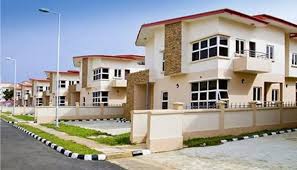
Nigerians displaced as rents double in inflation-hit Lagos
Nigeria's economic crisis is significantly impacting renters in Lagos as landlords transfer the burdens of escalating inflation onto residents — further displacing families, disrupting children's education, and exacerbating workers' notoriously lengthy commutes.
With a population exceeding 20 million, the nation's expansive and continually enlarging economic hub has struggled for years to meet housing demand, with approximately 3,000 individuals added to its population daily.
However, government-initiated economic reforms, including the floating of the naira currency and the elimination of a fuel subsidy, have introduced considerable disruption to the economy.
In a city that is home to the offspring of oil wealth, a robust middle class, and millions of informal workers, rents are surging on both Lagos' affluent islands and the more affordable — and impoverished — mainland.
"I may need to find a way to negotiate with my landlord," stated Yemisi Odusanya, a 40-year-old cookbook author and food blogger.
After giving birth to twins last year, she is skeptical that she can secure a better rental arrangement elsewhere for her family of seven, even following a 120 percent rent increase imposed by her landlord in Lekki.
"I intend to relocate," Bartholomew Idowu, a transportation worker, declared emphatically, although he was uncertain about where he and his children would move.
The mainland resident's landlord imposed a 28 percent rent hike, increasing the rate from 350,000 naira ($232) annually to 450,000 — a considerable amount in a nation where the GDP per capita stands at $835.
– Children changing schools –
The government recently amended its inflation statistics, revising official year-on-year inflation for January down to 24. 48 percent, from December's figure of 34. 80 percent.
This adjustment has provided little comfort to ordinary Nigerians.
"The current solution is to find a means to pay," remarked Dennis Erezi, a journalist, emphasizing that his 31 percent rent escalation remains more economical than relocating.
Jimoh Saheed, a personal trainer, was compelled to vacate his one-room apartment in a middle-class area in Ikoyi when his landlord more than doubled his rent to 2. 5 million naira a year and a half prior.
Relocating to the mainland resulted in him being farther from his clients, and his two children had to change schools, incurring transportation costs since they were no longer within walking distance to their classes.
Late last year, his new landlord implemented a 25 percent increase in rent.
"This situation is affecting me emotionally, it is impacting my mental state, and indeed, it is influencing me physically," expressed the 39-year-old, who noted that his earnings have not kept pace with inflation despite assuming additional work.
Lawyers assert that rent increases cannot be unilaterally enforced and must be subject to negotiation between the involved parties.
However, attorney Valerian Nwadike informed AFP that laws are seldom enforced without the imminent threat of legal action, highlighting a rise in tenant-landlord disputes over the past year.
– Luxury Market –
The government anticipates that its economic reforms will eventually yield positive outcomes, yet for nearly two years, Nigerians have endured the most severe economic crisis in a generation.
There are also underlying structural challenges: elevated interest rates render mortgages unattainable for the majority, and developers face a complicated regulatory environment, as noted by housing analyst Babatunde Akinpelu.
Lagos also accommodates a disproportionately large share of Nigeria’s employment opportunities—resulting in a continual influx of new residents.
Despite the presence of numerous cranes and construction sites throughout the city, many of the new developments are aimed at the high-end market—foreigners, Nigerians living abroad, or oil sector employees, many of whom derive their income in dollars.
Consequently, there exists a fragmented housing market in which the increased supply in the luxury sector does not benefit the remainder of the housing inventory, according to economist Steve Onyeiwu.
“Most of (Lagos's) landlords are subject to dollar-denominated expenses,” such as loans or mortgages for properties situated abroad, even as the value of the naira has plummeted, remarked a director at Island Shoreline, a property management firm, adding that his own landlord recently attempted to elevate his rent by 100 percent.
Enhanced public transportation, such as the new rail line connecting Lagos and Ibadan, may alleviate some pressure; however, he observed that there currently exists a “snowball effect” of escalating prices, requesting anonymity due to the sensitive nature of rent increases.
With leases typically requiring upfront payment for durations ranging from one to three years, both landlords and tenants endeavor to negotiate favorable terms to protect against inflation.
Nonetheless, the current surge in rents is “alarming,” remarked real-estate agent Ismail Oriyomi Akinola, who noted 200 percent increases on the affluent Victoria Island.
“Quality shelter is of paramount importance to every individual,” he stated. “It is essential not only for the affluent. ”





